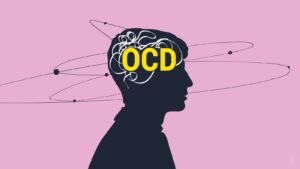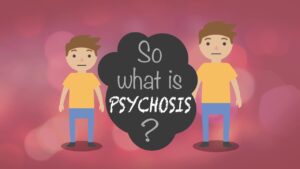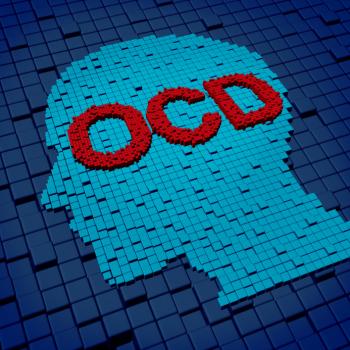If you or someone you know is struggling with OCD or psychosis, it’s important to understand the difference between the two conditions. In this blog post, we will discuss the symptoms of OCD and psychosis, as well as how they are treated. We will also provide information on resources that can help you get started on your journey to recovery.
Contents
What Is OCD?
 OCD is an anxiety disorder that is characterized by obsessions and compulsions. People with OCD may have intrusive thoughts or images that are unwanted and cause distress. They may also engage in repetitive behaviors or mental rituals to try to reduce the anxiety caused by the obsessions.
OCD is an anxiety disorder that is characterized by obsessions and compulsions. People with OCD may have intrusive thoughts or images that are unwanted and cause distress. They may also engage in repetitive behaviors or mental rituals to try to reduce the anxiety caused by the obsessions.
OCD is also a mental illness that can cause people to experience delusions and hallucinations. In some cases, people with OCD may believe that they are being harmed or that someone is trying to harm them. This can lead to paranoia and anxiety. People with OCD may also have difficulty functioning in everyday life. Sometimes there may be many things that can trigger symptoms of OCD.
What Is Psychosis?
 Psychosis is a serious mental illness characterized by a loss of contact with reality. People who are experiencing psychosis may see or hear things that are not there, believe things that are not true, or feel emotions that are out of proportion to the situation. Psychosis is a symptom of several different mental disorders, including schizophrenia, schizoaffective disorder, and bipolar disorder.
Psychosis is a serious mental illness characterized by a loss of contact with reality. People who are experiencing psychosis may see or hear things that are not there, believe things that are not true, or feel emotions that are out of proportion to the situation. Psychosis is a symptom of several different mental disorders, including schizophrenia, schizoaffective disorder, and bipolar disorder.
Psychosis is also a symptom of some physical illnesses and medications. It can be caused by a brain injury, sleep deprivation, drug abuse, or severe stress. Psychosis is not contagious, but it can be very frightening for both the person experiencing it and for those around them.
If you think someone you know is experiencing psychosis, it is important to get them help from a mental health professional as soon as possible. Psychosis is treatable, and early treatment can make a big difference in the long-term outcome. Sometimes there maybe be no obvious signs that someone is developing psychosis and it can be hard to tell the difference between normal teenage behavior and the first signs of mental illness.
Relationship Between OCD And Psychosis

The relationship between OCD and psychosis is not fully understood, but there are some key points to keep in mind. First, it’s important to remember that OCD and psychosis are two separate conditions. However, they can both be characterized by intrusive thoughts or images. Additionally, people with OCD may also experience delusions or hallucinations.
While the exact relationship between OCD and psychosis is still being explored, there are a few things you need to know. First, OCD and psychosis are two separate conditions. However, they can both be characterized by intrusive thoughts or images. Additionally, people with OCD may also experience delusions or hallucinations. Second, it’s important to seek professional help if you think you might be experiencing either condition. If left untreated, both OCD and psychosis can lead to serious consequences. Finally, there is still much research to be done in this area, so don’t hesitate to reach out to a mental health professional if you have any questions or concerns.
Also, the relationship between them can be characterized by the fact that people with OCD tend to have higher rates of psychosis than the general population. Some studies suggest that as many as 30% of people with OCD will also experience some form of psychosis. So, if you or someone you know has OCD, it’s important to be aware of the possibility of developing psychosis.
If you think you might be experiencing either OCD or psychosis, don’t hesitate to reach out to a mental health professional for help. Both conditions can be serious, and they often require treatment to improve. However, with proper treatment, many people can live healthy and fulfilling lives.
Signs of OCD And Psychosis

The signs of OCD and Psychosis can be very similar. Both conditions can cause a person to have intrusive thoughts, perform repetitive behaviors, and feel like they are in danger. However, there are some key differences that you should be aware of.
If you or someone you know is displaying signs of either OCD or Psychosis, it is important to seek professional help. These conditions can be very debilitating and interfere with daily life. Here are some key signs of the two conditions:
-Intrusive thoughts: People with OCD may have persistent, unwanted thoughts that they cannot control. These thoughts may be about dirt or contamination, harm coming to oneself or others, or orderliness. People with Psychosis may also have intrusive thoughts, but these tend to be more bizarre and may include thoughts about being watched or followed.
-Performing repetitive behaviors: People with OCD often perform repetitive behaviors, such as hand-washing, checking things, or counting. This is done in an attempt to reduce anxiety or prevent something bad from happening. People with Psychosis may also perform repetitive behaviors, but these are usually related to the content of their delusions (for example, a person with delusions of grandeur may pace back and forth while talking to themselves).
-Feeling like they are in danger: People with OCD may feel like they are in danger of contracting a disease or being harmed by others. People with Psychosis may also feel like they are in danger, but this is usually due to the content of their delusions (for example, a person with delusions of persecution may feel like they are being followed or watched).
These are some of the signs of OCD and Psychosis. If you or someone you know is displaying these signs, it is important to seek professional help.
Treatment of OCD And Psychosis

Treating OCD and psychosis can be difficult, but it is possible. There are many different treatment options available, and the best approach for each person may vary. Some common treatments for OCD include:
Medications
Medications are often used to treat OCD and psychosis. This can include antidepressants, anti-anxiety medications, and antipsychotics. Some of these medications can also help to reduce the symptoms of OCD and psychosis.
Antidepressants are a type of medication that can be used to treat OCD and psychosis. Antidepressants are a type of medication that can help to reduce the symptoms of anxiety, depression, and OCD. These Antidepressants can also help to improve mood and sleep.
Anti-anxiety medications are a type of medication that can be used to treat OCD and psychosis. Also, Anti-anxiety medications can help to reduce the symptoms of anxiety, including the intrusive thoughts and repetitive behaviors associated with OCD.
Antipsychotics are a type of medication that can be used to treat OCD and psychosis. These Antipsychotics can help to reduce the symptoms of psychosis, including delusions and hallucinations. Antipsychotics may also help reduce the symptoms of OCD.
Cognitive Behavioral Therapy
Cognitive behavioral therapy (CBT) is a type of therapy that can be used to treat OCD and psychosis. CBT can help to change the way a person thinks about their intrusive thoughts and repetitive behaviors. Also, CBT can help to reduce the anxiety and stress that are often associated with these conditions. CBT works by helping a person to identify and change the thoughts and behaviors that are causing their distress.
Exposure and Response Prevention Therapy
Exposure and response prevention therapy (ERP) is a type of therapy that can be used to treat OCD. ERP works by helping a person to expose themselves to their fears and anxiety-provoking situations. This can help to reduce the fear and anxiety that are associated with OCD. ERP also works by helping a person to learn how to prevent themselves from engaging in repetitive behaviors.
Acceptance and Commitment Therapy
Acceptance and commitment therapy (ACT) is a type of therapy that can be used to treat OCD. ACT works by helping a person to accept their intrusive thoughts and repetitive behaviors. This can help to reduce the anxiety and stress that are often associated with these conditions. ACT also helps a person to commit to making changes in their life that will help them to cope with their OCD.
Support Groups
Another treatment option for OCD and psychosis is a support group. Support groups can provide a safe and supportive environment for people with these conditions. Support groups can also help to educate and provide resources to people with OCD and psychosis. These support groups are also a great way to meet other people who are dealing with similar issues.
Self-Care
Another treatment option for OCD and psychosis is self-care. This can include things like relaxation techniques, healthy lifestyle choices, and stress management. Self-care can help to reduce the symptoms of OCD and psychosis. It is important to find what works best for you and to stick with it.
Some of these self-care activities are:
• relaxation techniques such as yoga, meditation, and deep breathing
• eating a balanced diet: Eating a balanced diet can help to improve mood and energy levels. It is also important to eat a diet that is low in sugar and refined carbs.
• getting regular exercise: Exercise can help to improve mood, sleep, and energy levels. It can also help to reduce stress.
• getting enough sleep: Sleep is important for overall health and well-being. It is also important to get enough sleep if you are dealing with OCD or psychosis.
• managing stress: Stress can be a trigger for OCD and psychosis. Learning how to manage stress can help to reduce the symptoms of these conditions.
• stress management activities such as journaling, writing down your thoughts and feelings, and spending time in nature.
How To Avoid OCD And Psychosis?

Avoiding OCD and Psychosis can be difficult, but there are some things you can do to help. These are some of the tips:
Avoiding Triggers
Avoiding triggers can help reduce the symptoms of OCD and psychosis. Triggers can be anything that causes you to feel anxiety or stress. Some common triggers include:
- certain places
- Also, certain people
- certain things
If you know what your triggers are, it can be helpful to avoid them.
Identifying And Challenging Negative Thoughts
One of the main symptoms of OCD and psychosis is negative thoughts. These thoughts can be about yourself, other people, or the world around you. It is important to identify these negative thoughts and challenge them. This can help to reduce the anxiety and stress that are associated with these conditions. Sometimes there may also be many different thoughts that are all connected. In this case, it can be helpful to write down all of the thoughts and then challenge them one by one.
There are many different ways to challenge negative thoughts. Some of these include:
- looking at the evidence: What is the evidence for and against this thought?
- looking at the worst-case scenario: What is the worst thing that could happen if this thought is true?
- Also, looking at the best-case scenario: What is the best thing that could happen if this thought is not true?
- using logic: Does this thought make sense?
- considering other perspectives: What would other people say about this thought?
Practicing Mindfulness
Mindfulness is a way of paying attention to the present moment without judgment. It can help reduce the symptoms of OCD and psychosis. When you are mindful, you can observe your thoughts and feelings without getting caught up in them. This can help to reduce the anxiety and stress that are associated with these conditions.
There are many different ways to practice mindfulness. Some of these include:
• meditation: Meditation is a way of focusing on your breath and letting other thoughts come and go. There are many different types of meditation, so it is important to find one that works for you.
• yoga: Yoga is a form of exercise that combines movement with mindfulness. Yoga can help reduce the symptoms of OCD and psychosis.
• spending time in nature: Spend time observing the world around you. Notice the sights, sounds, and smells around you.
• eating mindfully: When you are eating, pay attention to the taste, texture, and smell of your food. Eating slowly can also be helpful.
• talking to a therapist: A therapist can help you to understand and work through your thoughts and feelings.
Making these changes can be difficult, but it is important to remember that you are not alone. There are many resources available to help you. If you are struggling, please reach out for help.
Helping Someone With OCD and Psychosis
Helping someone with OCD and Psychosis can be difficult. Here are some things you should know:
Be Patient
Patience is something that is required when helping someone with OCD and Psychosis. It can be difficult for them to understand what is happening and why it is happening. Many different treatments can take time to work. It is important to be patient and understanding.
Educate Yourself
It is also important to educate yourself about OCD and Psychosis. This will help you to understand what the person is going through. There are many different resources available, such as books, websites, and support groups.
Encourage Them To Get Help
If someone you know has OCD or psychosis, it is important to encourage them to get help from a professional. This can be a difficult decision for them to make, but it is important to let them know that you support them and are there for them.
Support Them In Their Treatment
Once someone with OCD or psychosis begins treatment, it is important to support them. This can include attending therapy sessions with them, helping them to stick to their medication regimen, and providing emotional support.
If you or someone you know is struggling with OCD or psychosis, please reach out for help. There are many resources available to you. You are not alone in this.
Conclusion
OCD and psychosis are two very different mental health conditions. OCD is an anxiety disorder characterized by obsessive thoughts and repetitive behaviors. Psychosis, on the other hand, is a mental state characterized by delusions and hallucinations. While both conditions can be debilitating, they require different treatments. If you or someone you know is struggling with either OCD or psychosis, it’s important to seek professional help. With treatment, both conditions can be managed and people can live fulfilling lives.
If you think you may have OCD or psychosis, please reach out to a mental health professional for help. There are many resources available to those who need them. Remember, you are not alone in this battle. Millions of people around the world suffer from OCD and psychosis, but with treatment, recovery is possible. Your mental health — Your psychological, emotional, and social well-being — has an impact on every aspect of your life.
Hope this article was of help to you! If you are suffering from OCD, you may seek help from Therapy Mantra. We have a team of highly trained and experienced therapists who can provide you with the tools and skills necessary for overcoming OCD. Contact us today to schedule an online therapy or download our free OCD treatment app on Android or iOS for more information.


